- Internauts like to play, but they are mindful about their privacy.
- Regulations on privacy and use of third-party cookies.
- Changes in Facebook Ads performance and costs.
- Meta’s measures and developments to maximize performance
- Meta’s recommendations to maximize Facebook Ads performance
- Build brand trust to collect First-Party Data
Rick Kelley is Meta’s VP for Gaming, Facebook’s division in charge of live and prerecorded gaming. In Facebook Gaming’s most recent newsletter, Kelly has explained in three videos what’s happening in the industry. And generally, what is happening in the marketing world and everything connected to user data privacy.
In the first video, Kelly states that a confluence of important changes is redefining performance marketing.
“There is a growing, more diverse global audience, a greater demand for privacy, and a changed advertising ecosystem that is impacting the gaming world” explains Kelly. This analysis and its conclusions can be extrapolated to other advertisement sectors, as they fall under the same regulations, and are affected by the same audience trends.
There are close to 3 billion gamers. They are very diverse and have many different motivations and span through all age groups.
Internauts like to play, but they are mindful about their privacy.
Just like we had previously stated at Easypromos, and confirmed by the statistics that Facebook has compiled in the last years, the amount of gamers has increased, especially as of 2020. This was partially influenced by the pandemic and the intensive use of the internet that the lock-downs provoked. There are close to 3 billion gamers in the world. They are very diverse and have very different motivations. Additionally, the span through the whole age spectrum, as shown in this chart from Kantar that Facebook made public.
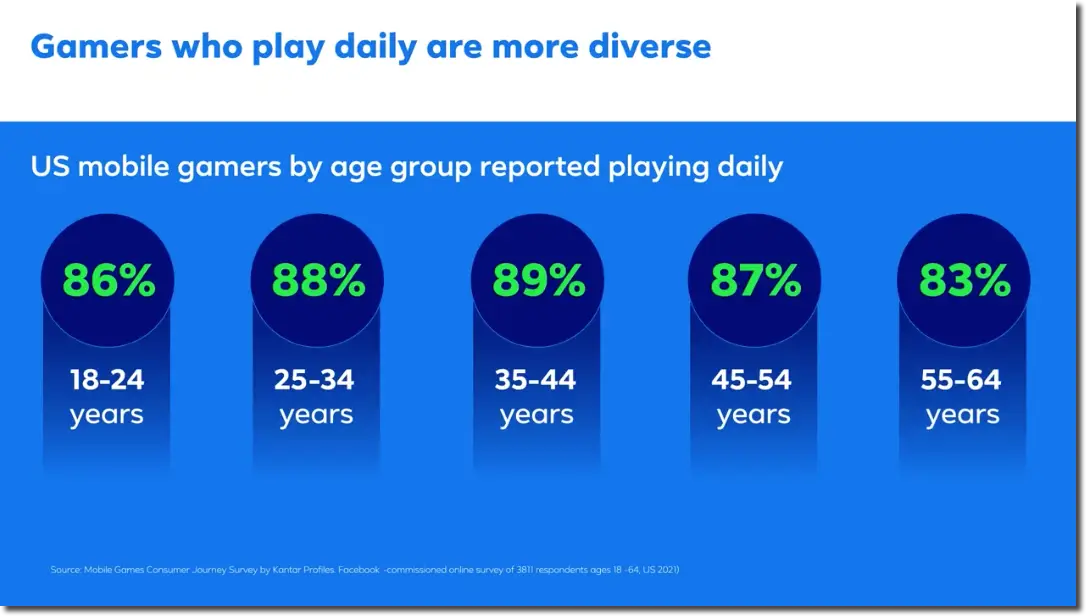
“As people have become accustomed to gaming anytime from anywhere. They are also more mindful of how businesses use their data. People expect to have the ability to choose and control how they interact with businesses. Whether having a say on what date they share or being more selective in the content they watch. At the core, people want transparency, control, and fair exchange when sharing their data. And this matters as 54% of US mobile gamers are uncomfortable sharing personal information with game developers”. Pointed out Rick Kelley.
Regulations on privacy and use of third-party cookies.
The first of the three-video series that Facebook has launched is titled “Reimagining Games Advertising”. The first one explains how the privacy regulation on the Internet has evolved. There are several milestones in this evolution. This DCN article lays out the history that has led to the cookieless world.
In recent years, governments and regulating bodies have implemented several privacy regulations, as mentioned by Rick Kelley. It all got rolling in 2009 with the E-Privacy guideline. Later on, in 2018, the GRPD was implemented, as well as the CCPA (California Consumer Privacy Act of 2018), effective as of 2020. As a result of these regulations, web-search engine companies have been putting into effect measures to comply with these regulations. Firefox blocked third-party cookies by default in 2019. Google announces that by 2022-23 it will cease to admit third-party cookies. Lastly, Safari started blocking third-party cookies in March 2020.
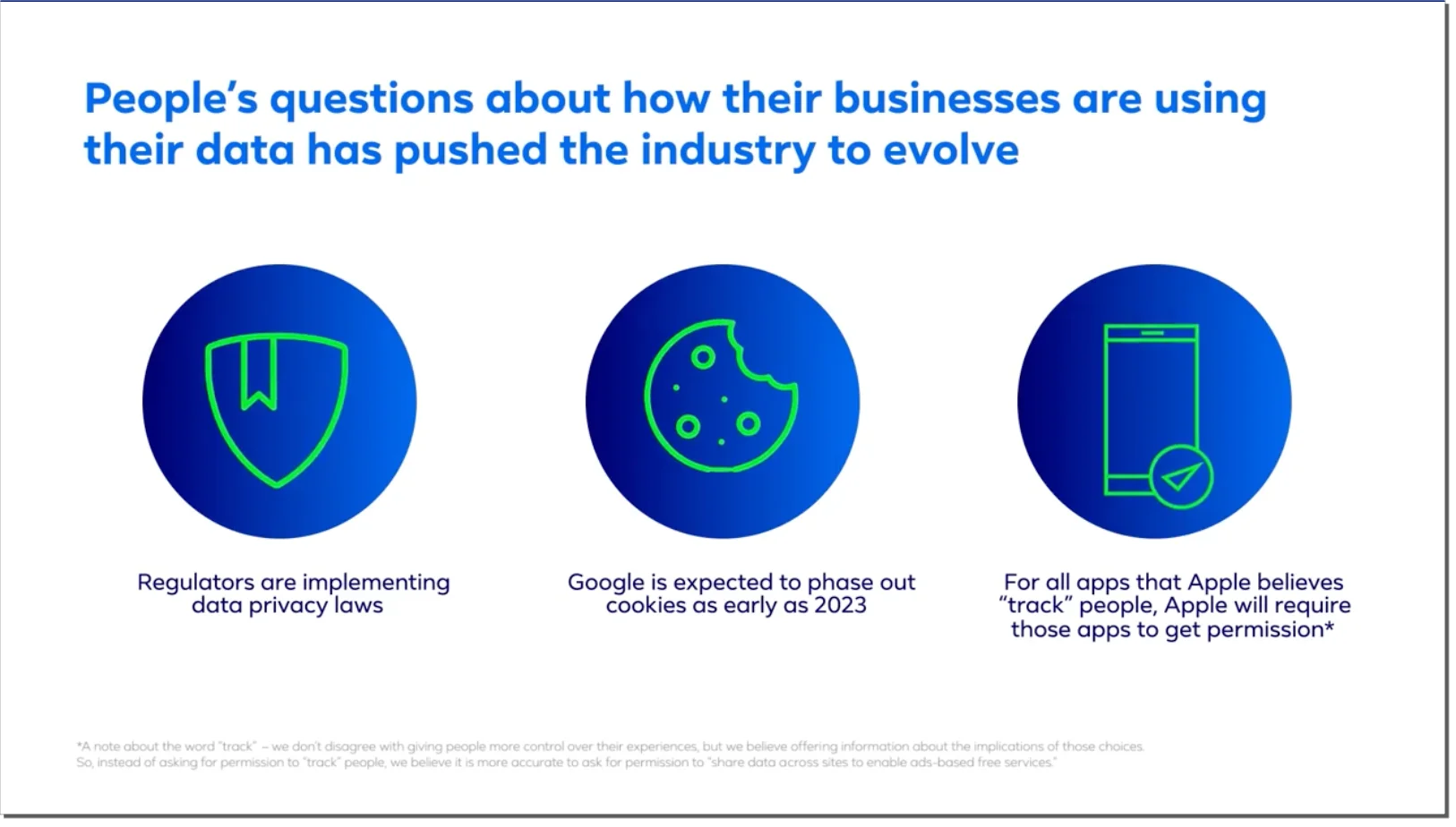
“We support these changes because we want to give people more choice and transparency. However, these changes mean that marketers have less data at their disposal. And this is leading to some real challenges, of which I know you are acutely aware”, concludes Facebook Gaming VP.
Changes in Facebook Ads performance and costs.
It is now harder to evaluate if an Ad has achieved its sales objectives as Facebook Ads reports fail to show it anymore. This is a consequence of the changes in the tracking of users through cookies. In these videos, Facebook acknowledges its clients’ requests and frustration and states that they are actively looking for a solution. Nonetheless, they also note that we are now entering a new level of performance marketing. “The aforementioned changes mean the future will be less reliant on individual third-party data, and this is where we welcome innovation”, stated Rick Kelley. “Businesses will have to think differently about everything: marketing, strategy, creative, privacy; and approach them in new ways. This new approach will define the future of performance marketing”, added Kelly.
These Facebook Gaming videos clearly explain the inflection point in the marketing world that we are currently living in due to regulation changes and the evolution of online audiences. In the second video, Facebook talks about the solutions that Meta is developing to optimize marketing campaigns’ performance on their platform. Finally, in the third video, they recommend the actions that brands should undertake to face this new level -or ecosystem- of performance marketing.
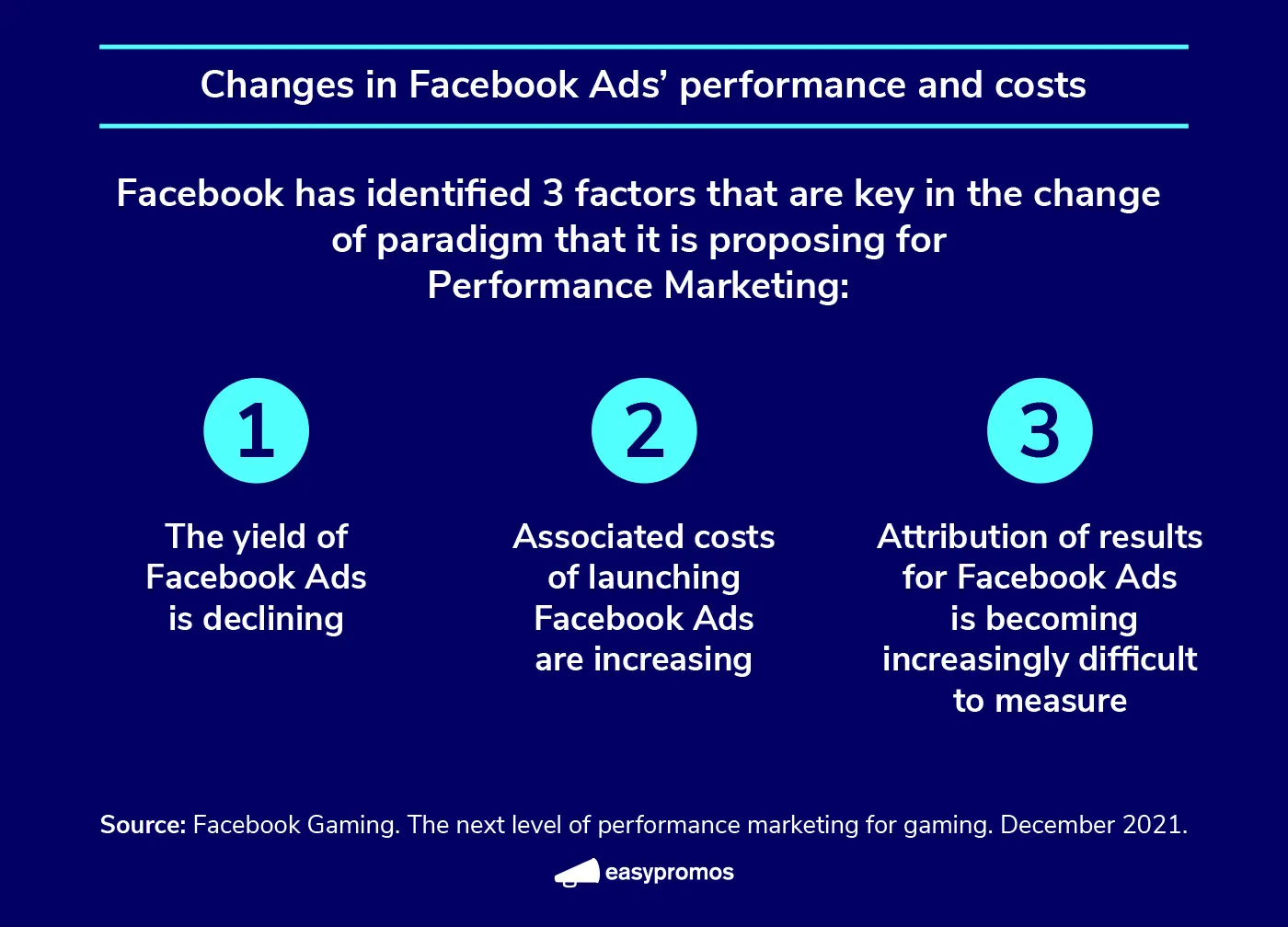
It is now harder to evaluate if an Ad has achieved its sales objectives as Facebook Ads reports fail to show it anymore. This is a consequence of the changes in the tracking of users through cookies. In these videos, Facebook acknowledges its clients’ requests and frustration and states that they are actively looking for a solution. Nonetheless, they also note that we are now entering a new level of performance marketing. “The aforementioned changes mean the future will be less reliant on individual third-party data, and this is where we welcome innovation”, stated Rick Kelley. “Businesses will have to think differently about everything: marketing, strategy, creative, privacy; and approach them in new ways. This new approach will define the future of performance marketing”, added Kelly.
These Facebook Gaming videos clearly explain the inflection point in the marketing world that we are currently living in due to regulation changes and the evolution of online audiences. In the second video, Facebook talks about the solutions that Meta is developing to optimize marketing campaigns’ performance on their platform. Finally, in the third video, they recommend the actions that brands should undertake to face this new level -or ecosystem- of performance marketing.
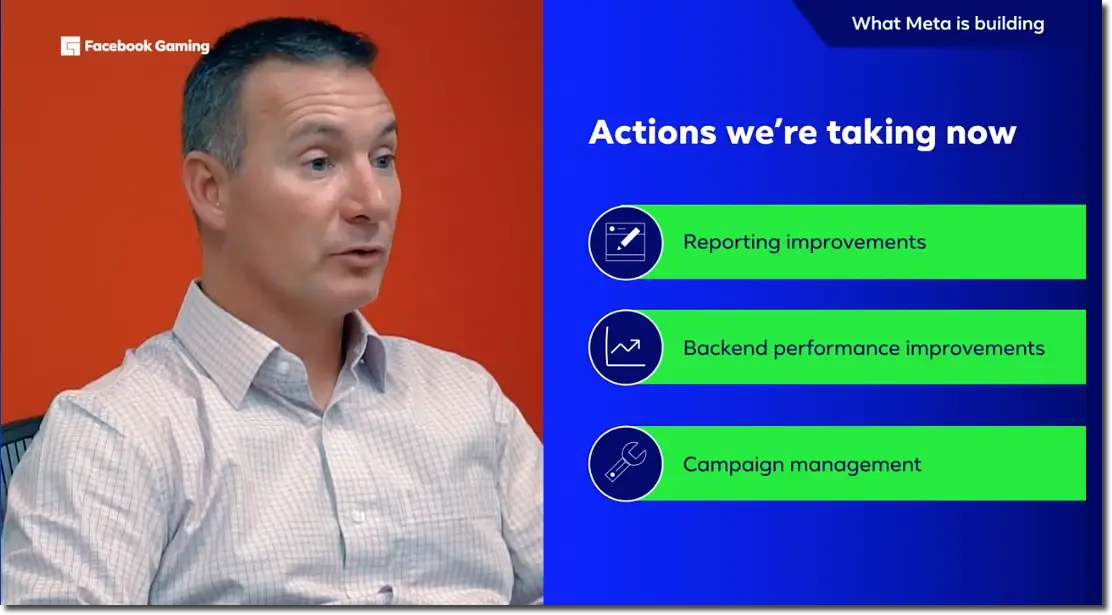
Meta’s measures and developments to maximize performance
It looks like many Facebook Ads clients from the gaming sector have expressed their dissatisfaction regarding the campaigns’ performance in the last months. Rick Kelly has said that they are listening to them and taking action in several ways. And that they will continue to develop and inform about them as they are implemented. Furthermore, he groups these measures into three broad categories
- Reporting improvements
- Backend performance improvements
- Campaign management
As an example, he mentions enabling views through conversion to attribution, despite the tracking difficulties. This aspect specifically, has helped improve the attributions in campaigns for IOS 14 and the SKAD network.
There are success cases based on this kind of campaign using the brand’s First-Party Data to optimize ad segmentation.
However, Facebook Ads’ main technology bet is on the Conversions API, which aims to maximize campaign performance as well as safekeeping user privacy. We already have success cases based on this kind of campaign using the brand’s First-Party Data to optimize ad segmentation, reduce cost per action, and measure more accurately.
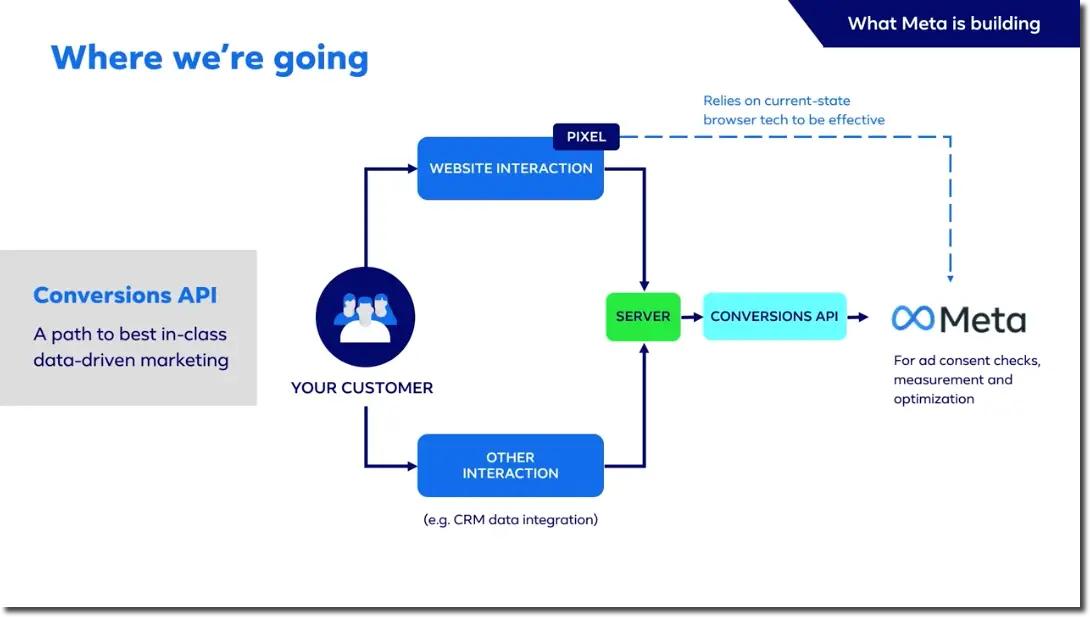
Meta’s recommendations to maximize Facebook Ads performance
The last video in the series focuses on advising brands to implement measures that improve their Ads performance. It starts by pointing out 5 actions that are part of the new performance marketing equation:
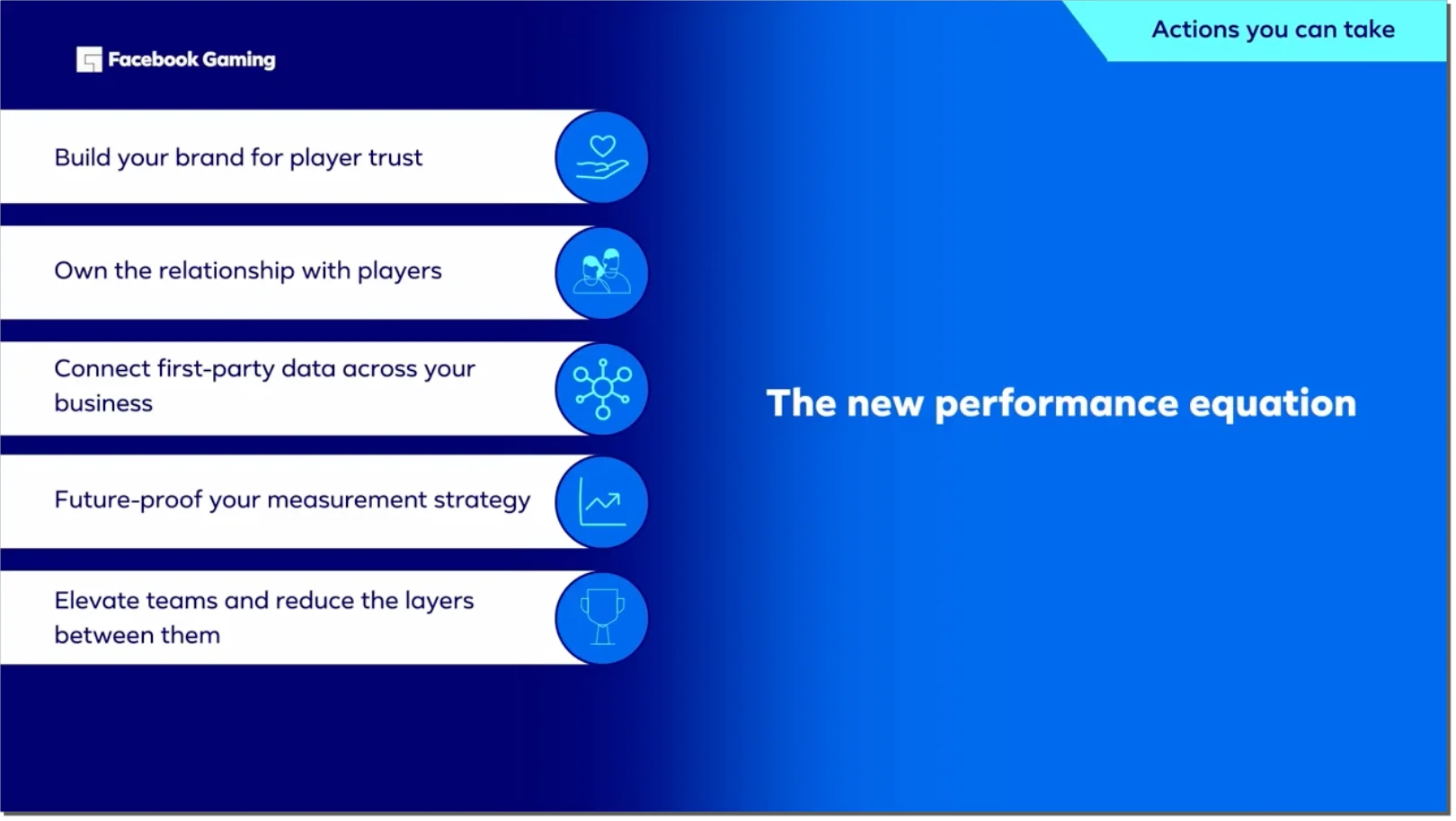
- Build a brand that users trust.
- Own the relation with your users.
- Connect First-Party across your business.
- Futureproof your measurement strategy.
- Elevate teams and reduce the distance between them.
Kelley highlights that directly obtained data will become increasingly important as third-party data becomes less available. To procure these data, the trust that the brand generates among its users is paramount. The deeper and stronger the relationship between gamers/users/audience and the brand, the more engagement and interaction there will be. Furthermore, it will be less costly for the brand to gather potential or existing clients’ data through Zero-Party and First-Party Data.
Brands can no longer rely on passive user data collection. They must obtain and own their audience data, and therefore, they must have a data collection strategy.
Along these lines, the fact is that brands can no longer rely on passive user data collection. They must obtain and own their audience data, and therefore, they must have a data collection strategy to collect them. Additionally, brands must measure, analyze, and use this First-Party Data to boost their advertising performance. This not only applies to the moment of collection, but it should keep going throughout the whole relationship with the customer.
Build brand trust to collect First-Party Data
Several studies show that users are more comfortable sharing their personal information with a brand they trust. As mentioned by Rick Kelley, “to build your brand, think about every touchpoint as an opportunity to turn a potential player into a loyal fan”. “To source first-party data, you need to own the relationship with players. Consider the ways you can encourage the players to securely share personal information while providing value to their gaming experience. Value can come in many forms, such as a reward or easing up the play”. This is where Easypromos’ solutions can be of great help to brands. Its giveaways, contests, gaming, coupons, and promotion apps allow for Zero-Party Data and First-Party Data data collection in exchange for incentives and prizes.
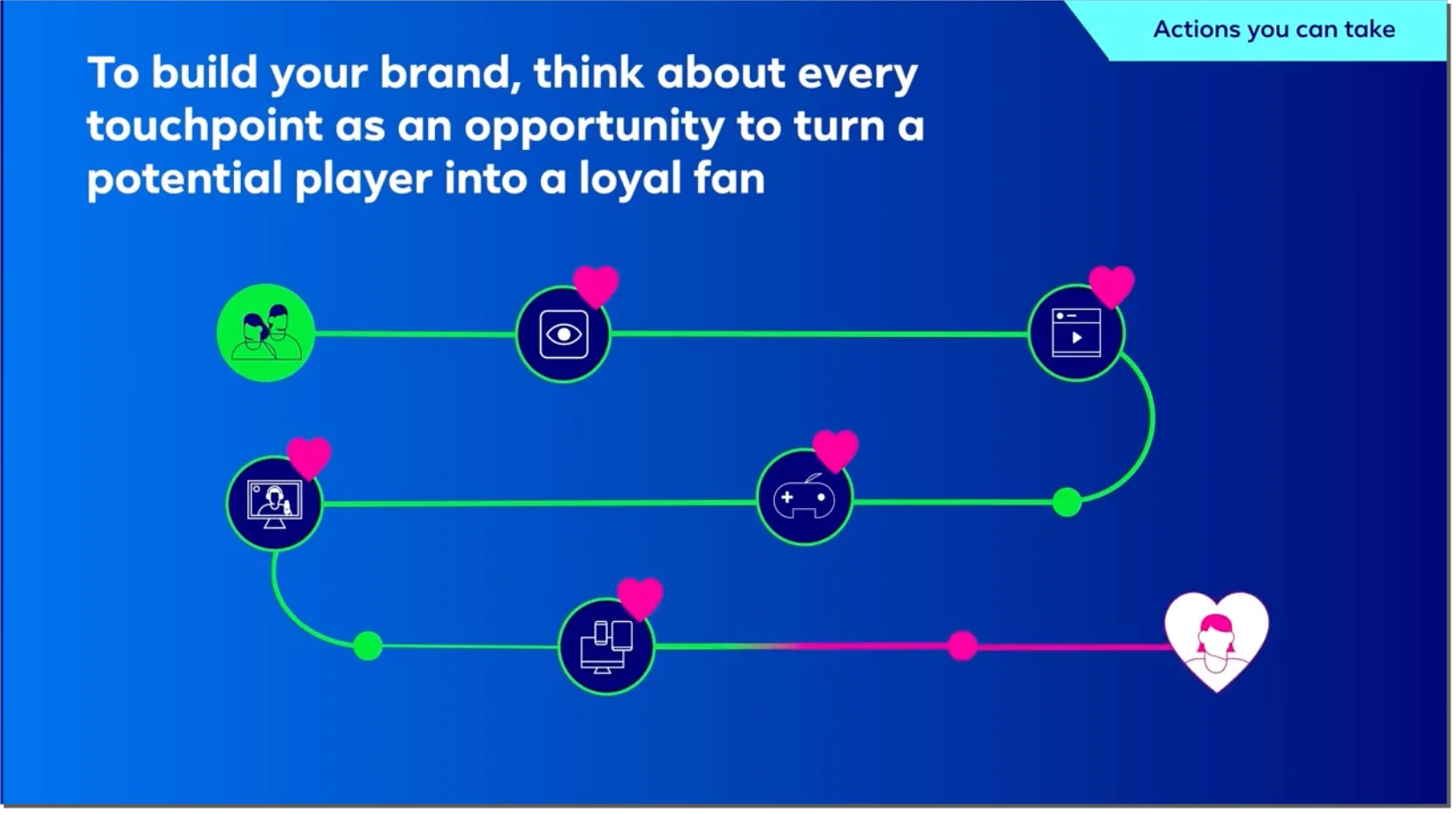
A gamers survey from 2021 showed showed that US mobile gamers who were uncomfortable with sharing personal information, would be motivated to do so by:
- 45% In-game rewards.
- 35% Easier login/account creation
- 35% Promotions and deals in-game
“Owning the relationship becomes increasingly important as foundational solutions as the conversion API connects your own marketing data to help optimize Ads marketing, which will also help run privacy-enhancing technologies”, concludes Kelley.
As you know, with Easypromos you have a wide variety of dynamics to attract, motivate, and turn the target audience into Zero-Party Data and First-Party Data. Collect user contact details with all the GDPR warranties. Easily integrate collected data with your email marketing, CRM, or any other database. If you have any questions regarding your next data collection marketing campaign, contact us via live chat, our support team will be happy to help you.